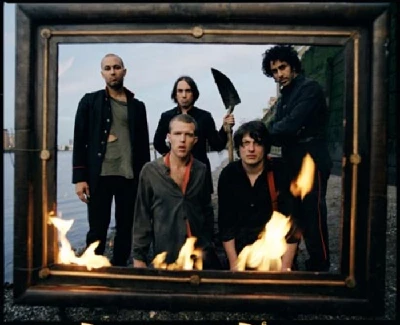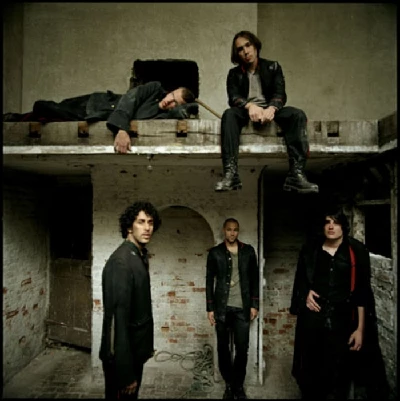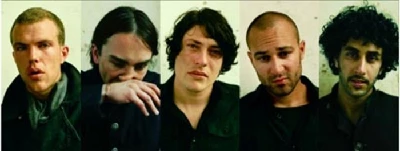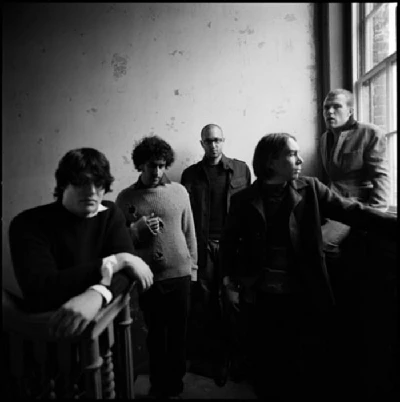published: 30 /
11 /
2005
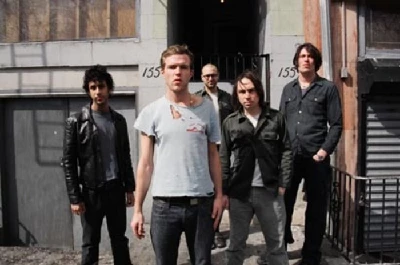
Formed out of the ashes of the almost massive the Crocketts, the Crimea have just released their debut album 'Tragedy Rocks'. Members Andrew Stafford and Andy Norton talk to Jamie Rowland about their anthemic form of rock and its American recording
Article
In 2000, the Crocketts looked set for big success; they had toured incessantly throughout the UK, including making an appearance at the Reading Festival, and had received praise from many different publications. The band, however, broke up in 2001; “shot down in the springtime of their life”, as a press release explained.
But in 2002, a new band, the Crimea, rose from the ashes.
Guitarist/vocalist Davey MacManus and drummer Owen Hopkin brought the band together after the demise of the Crocketts, with Andrew Stafford coming in on keyboards, Joe Udwin on bass and Andy Norton on guitar.
The Crimea make beautiful and carefully constructed rock songs; working with layers of music and lyrics based around themes of sex, alcohol abuse, religion and love.
After years of solid touring, the band finally got signed to Warner Bros. and in October this year released their brilliant debut album, ‘Tragedy Rocks’.
On their UK tour to support the release, Pennyblackmusic met up with Andy Norton and Andrew Stafford at the Brickyard in Carlisle.
PB : Your debut album, ‘Tragedy Rocks’, was recently released. How did the recording process go. Was it all smooth going?
AN : It was anything but smooth really. It was a very long process.
AS : Yeah, it was. You know, we started off doing some sessions down in Mississippi. We were supposed to be there for five weeks. It ended up being two months, and we did five songs in that time, which took a long time. There were a few, sort of, run ins; Davey had a few run-ins with the producer. Then we recorded some more stuff in New York and we recorded some more stuff in the house, and it all ended up being mixed in New York, so it was really cobbled together out of three different recording sessions, so it’s kind of taken really, to finish the album from start to finish, it’s taken three or four years. I mean, in total, like in terms of writing the songs and eventually getting the songs finished as to how we wanted them to be. We finished recording the record in February this year.
PB : I know it’s taken a long time; I remember hearing ‘White Russian Galaxy’ being played on John Peel’s show a couple of years ago.
AS : Yeah, well we’ve re-recorded that. The version on the album’s a re-record. The original versions we had were just demos that Davey had recorded in his house, so we wanted to make a proper album that sounded sonically good enough. But, yeah, it was hard work. But worth while!
PB : I’d agree with that. It’s a great album! How do you go about putting songs together ? What’s the song writing process for the band?
AN : Well, the kind of basic song writing stuff stems from Davey really. He’ll bring a basic arrangement or basic chord pattern and some lyrics to the table, and it all gets fleshed out from there. Andy will start twinkling on the piano. I’ll start going over…basically, there’s a 16 track in the house - well, actually, it’s been upgraded to a 24 track now - and we’ll just get things on loop and start writing licks and piano hooks and riffs over the top of it, so it kind of evolves and gets re-recorded and things get mashed together.
AS : Davey’s the main song writer. He comes up with the main structure, and obviously he comes up with all the lyrics as well, but I think the way Davey works is he has ideas for a verse and a chorus, and sometimes they’ll get bolted together, separately, so sometimes he’ll write a song, and it’ll be "Yeah this is the verse, bridge and the chorus, and that’s how it is", but other times it’s like "Oh, I’m going to use this chorus for this verse". So, 'Baby Boom', for example, was a kind of coming together of about four different songs, and then eventually he came up with the winning formula, as it were, so it’s quite a good way of song writing I think. But it can sometimes take a long time.
AN : Since we’ve been on the road, we’ve all been jamming together. We’ve been road testing some new songs; on this tour as well, actually. Whether they sound like clichéd "on the road"’ songs, I don’t know, but I think they’ve gone down well.
AS : But it’s always good to try out new songs on the road, because you can see what kind of reaction you get, and see how it feels to play them live and it can evolve into something else, so, like, the songs that we play tonight that are new might not sound like that when we eventually come to record them.
PB : You’re just at the beginning of your UK tour now; do you prefer playing live and touring or being in the studio?
AS : Fuck, it’s a hard one that. I mean it’s so different, isn’t it? I know that some bands have a problem with playing live, and I think the problem with it is all the shit that goes with it; all the travelling, and the planning and the organisation and the arguing…
AN : But we actually love that. We love the arguing.
AS: Yeah, I guess so. There’s definitely a lot of love-hate relationships in the band, and a lot of tension. Sometimes it can come out in the live performance. It can be quite explosive. Sometimes it’s such hard work getting to the show, and sound-checking, and dealing with all that shit, that you almost put more work into the show because of that. At the stage where we’re at, we’re still doing everything quite cheaply, and doing everything ourselves, and…well, that’s the live side of it, the recording side of it can be equally as arduous and hard work, but great as well when you come up with the right thing. I think they’re both so different; it’s hard to say which one you prefer. Which one do you prefer, Andy?
AN : I actually think I prefer the live ones, just because there’s a bit more of an adrenaline rush. You do get moments, with the recording, if you’re feeling a bit creative, and you get like a moment where, you know, things start coming together very quickly and people start writing parts and things come along. But I think with a live set, you get a 30 minute, 40 minute adrenaline rush, or sometimes it turns out very bad, and you’re actually gutted after the show, but either way you come off very sweaty and high.
AS : I think the live show is really what being in a band is about. Ultimately you can make your songs sound as brilliant as you want in the studio, but the live show is where the magic really emerges. I think all my favourite bands are good live bands so that’s got to be what it’s all about.
PB : You independently released ‘Tragedy Rocks’ last year. What made you decide to re-release it now you’re on a major label?
AN : Well, it was more of a major label decision really, wasn’t it?
AS : Kind of, yeah. It’s quite a convoluted story really. We were looking to get a deal with the songs and with the demos that we’d done. Davey always had a vision of going into the studio and really doing it properly in a good studio, to really make them sound good. What we ended up doing was recording it ourselves and taking it with us to America to try and get a record deal, which worked, and then the label basically said to us. "Well, this record is great, but we really want to record it again and make it sound even better, because the songs are so strong." I mean, it’s not exactly the same, I think there’s five songs that are the same, but there’s four new ones as well. I also think that the songs that we’ve re-recorded sound quite a lot different. So that’s the reason that we decided to do it again. Also, because we only did 1000 of the original CD, and we think we could sell 2 million records, it just seemed such a shame to say that’s it with those songs.
PB : You recently played the BT Digital Music Awards. Connected to that, what are your feelings on the way the music industry is having to evolve with technology?
AN : I think it’s a positive thing in that there’s a lot of music being shared a lot quicker, and I think the fact that people can share between different countries and it’s such an international thing now is really good. I personally don’t have any qualms about it. There’s a lot of fuss made about certain aspects of music on the internet and how "cool" it can be, and I’ve noticed there’s certain trends evolving - I don’t want to mention any names – but, eventually they go down the wrong path anyway and become very corporate, but I think, yeah, generally it’s a good thing.
AS : I think it’s good, especially for younger bands, new artists, because, I mean, word of mouth spreads really, really quickly with young kids, so it means that you can reach a far broader audience than you ever could before, far quicker. I think for more established artists it’s probably not as good a thing; with internet file sharing and free downloading, and I think that big artists, like Madonna and Coldplay, are definitely losing a lot of money to that side of things. I think that that, indirectly, can affect new artists as well, because record labels are making all their money through the big artists and that’s funding the new bands that they sign. So it’s definitely very controversial. For us we don’t care if everyone downloads our stuff, because we think that if they’re doing it, and they download it and get it all free then there’ll be more people coming to our shows, which is great. The more people that come to your shows the bigger you get. The bigger you get the more people come to your shows, and so on, and then eventually people go out and buy the record anyway.
PB : You were saying earlier how you recorded the majority of the album in the US, and you’ve also toured a lot over there. How do the audiences in the UK compare to those across the pond?
AN : It kind of depends what part of the US you go to, or what part of the UK. I think every town’s slightly different, isn’t it?
AS : Yeah, it is. That’s a question we’ve had quite a lot really. You know, being a British and over in America, it feels very exotic, and when you leave LA and New York and go out into the country, if you’ve got a British accent, you’re treated like a rock star, even if you’re not, but we are rock stars as well, so people think it’s absolutely great. They absolutely love it. We have a great reaction in the mid-west and a great reaction in the south, and they love the enthusiasm and the energy we put into the performance; Americans really, really "dig" that kind of thing. Whereas, over here, I think that we’re just another travelling British band, who are trying to break and trying to get big. It’s the same with an American band coming over here. When an American band comes to the UK, I think there’s a lot more excitement generated by it because they come from America, so it’s like that for us when we go to the States. I think the fans are a little more guarded over here, but they’re both great and we’ve had some great shows on both sides. It’s subtle differences.
PB: I read on your website that you do an annual Christmas show. How long have you been doing it, and how did it come about?
AN : It’s been a few years, hasn’t it? We do it at the Enterprise; it’s like a little venue near the Barfly…
AS : In London…
AN : And it’s always an acoustic show. We put up the Christmas lights and stuff.
AS : We’ve been going for over 3 years as the Crimea. Andy’s been in the band for just over 2. We’ve always done it since we started out. The Enterprise is a little pub in London, like Andy says. It probably holds about 100 people upstairs, and it’s where we played our first ever gig, so we always go back there. It’s acoustic, so it’s a different vibe, and it’s a little bit more quiet and laid back, and we bring in slide guitar and it’s all nice. I mean we’ve always done it and it always sells out, and the fans always say it’s their favourite show.
AN : Trying to think when our Enterprise gig is…
AS : It’s on the 21st
AN : Yeah, the 21st of December.
PB : Do you ever slip any Christmas carols in or anything like that?
AN : We do the odd cover, don’t we? We don’t want to spoil anything.
AS : We always do some covers. We don’t want to spoil any surprises, I’m sure we’ll have a few for this one. I don’t think we’ve actually done any Christmas covers. No, I don’t think we’ve been able to be that cheesey. We sometimes talk about it, but we haven’t gone that far yet.
PB : I can see what you mean about it being a bit cheesey.
AS : Yeah, it’s just a little bit too much for us, so no. But that’s not to rule anything out in the future.
PB : Just going back to the subject of America quickly, what made you decide to have some different tracks on the US and UK versions of the album?
AN : Again, that was a label decision really. Because, with labels, you’ve got the US version and the UK version and they’ve got different thoughts and what should be released and what should be this and that, so it all came down to them more than anything.
AS : It did come down to them, but…to be honest, the US version was 13 tracks long, and our man at the label was like "Well, they’re all brilliant tracks. We can’t take any of them off. Whereas over here, the record label did kind of say we want it to be a little bit shorter. So we talked about what songs to take off and stuff like that. But we’re going to be giving all the other songs that aren’t on it away to the fans, because we think it should be like that.
PB : I’ve read quotes in the past that have mentioned the band liking Brian Wilson’s term "pocket symphonies", and this coupled with the song ‘Bad Vibrations’ made me wonder whether Wilson has a particular relevance to the band?
AN : There is in the way that the harmonies are built up, and the way that sometimes there’s loads of tracks built up, you know, lots of guitars, and pianos and keys kind of all woven together.
AS : I don’t think you could ever really weave together and play the harmonies the Beach Boys did. We’re not trying to be the Beach Boys. But I think, with that song, it definitely hinted at ‘Good Vibrations’ and maybe some of the music’s kind of, not so much poking fun, but there’s a little bit of irony to the song. I don’t think we sound anything like the Beach Boys to be honest, but I would say there’s definitely an influence there. We’re all big fans.
PB : I’ve just got one more question left; which is what your plans are for the next year, once the tour’s over?
AN : After the tour, we’re going to do that Christmas gig, and then come back out in January, touring with the single. We’re going to be releasing ‘Lottery Winners on Acid’ as the first proper single.
AS : We’re just going to be touring all year. I mean, we’re planning on going to Australia and New Zealand hopefully. We’re definitely going back to America very soon in the New Year, and everything being well then we’ll be touring everywhere: Europe, Japan, Australia, more tours in America…
AN : And back to Carlisle again, I should think!
AS : Yeah, touring’s all we’re going to be doing next year. And we’re going to be hopefully recording some new stuff. I don’t know whether we’ll be going into the studio. It all depends on how well everything goes, and how much touring the record label wants us to do.
PB : It sounds like you’ll be needing some time off after the next year, then!
AS : Yeah, well, we’ve always been a touring band. We’ve been touring ever since we started. Even before we got a deal we were doing over 100 shows a year, which we just sorted out ourselves. We’ve always toured, we’ve toured with hundreds of bands. You have to tour. That’s how you pick up fans. And the Crocketts, who were the last band, used to tour incessantly, so it’s all Davey’s done for the last 10 years.
PB : Thank you.
Picture Gallery:-
